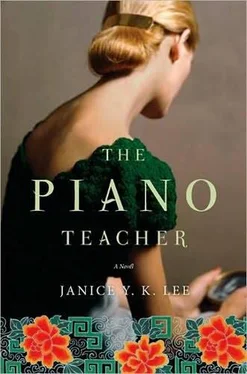“Nonsense,” she says. “And I don’t want to be alone.”
“Let’s not quarrel,” he says gently. “Call Angeline. Then go over to her house. Have her send her boy to escort you. And I’ll ring you there when I’m able. You should probably stock up on some food as well.”
He kisses her cool cheek and leaves.
In town, he drives by the King’s Theater. It still seems to be operating. My Life with Caroline is the feature and there are, astonishingly, a few people queuing up for tickets.
When he reports to HQ, it’s abuzz with activity, men jostling for space and supplies, with a sense of urgency he has not seen before. Outside, it’s eerily quiet but for the intermittent boom of bombs. He sits and waits for his assignment. There’s a map over a desk with the colony marked out. A dotted line is drawn from Gin Drinkers Bay to Tide Cove with a fortress at Shing Mun-the first line of defense. There’s been a concrete tunnel built south of the Jubilee Reservoir where soldiers can climb to pillboxes to fire. “This should keep us for a while,” a man says, noticing Will studying the map. “It’s fairly difficult to breach, I’d say.” On the wall, someone has typed up excerpts from General Maltby’s speech that morning: “It is obvious to you all that the test for which we have been placed here will come in the near future. I expect each and every member of my force to stick it out unflinchingly, and that my force will become a great example of high-hearted courage to all the rest of the British empire who are fighting to preserve truth, justice, and liberty for the world.”
Suddenly, over the radio, they hear Roosevelt ’s voice. “Quiet, dammit,” someone shouts. The volume is turned up. Roosevelt announces the bombing of Pearl Harbor and a quiet shock descends upon the office.
Roosevelt is done, and there is the buzzing of the radio before the announcer comes in. “And that was President Roosevelt of the United States…”
“That’s good for us,” a fellow says finally. “Means the Americans are in it now, whether they like it or not.”
“It means the war has gotten much bigger,” says another, quietly.
SHE WAS PARANOID. She always had been. When she pushed open a door or picked up a wineglass, she made a point of smudging the slight map that her oils, finger whorls, and dust had created-as if Scotland Yard were hot on her trail. She didn’t want to be leaving clues, fragments, parts of herself, around. When she ran her fingers through her hair, she kept the strands that slid out, and disposed of them in a dustbin. Her fingernail parings were housed in a tissue and flushed down the toilet.
This paranoia was beneficial, it turned out. Martin, distracted with work, with the workings of water, never noticed that her comings and goings had suddenly taken on a much more deliberate air. Must get Darjeeling at the shop, must go visit at St. Stephen’s Hospital every Thursday, must do a lunch with the girls every Wednesday. She limited their intimacy to the bare minimum. She could not think that she was that woman, that woman she had heard her mother and her friends talking about in the kitchen, that woman who went from man to man in a single day. The kind of woman who could be kicked out of the colony and sent home on a ship in disgrace.
The awful thing was, she didn’t feel as badly as she thought she ought to. She had always thought of women who had lovers as immoral women who cared nothing about society and manners and the way things should be. And yet, here she was, carrying on with a man who didn’t even particularly seem to like her. And Martin was good. This was the inescapable fact. And he was good to her. Whether he loved her, she didn’t know. He was certainly pleased to have a wife and a home and all of that taken care of, but she didn’t know how much of that had to do with her as a person. Sometimes she felt that he had married her, dropped her into a slot labeled “wife,” and gotten on with his life. But she was sensible enough to see that she was the guilty one in this arrangement. Martin was guilty of nothing but benign neglect. She was taking advantage of a good man.
But any bad feeling she had about the situation was always drowned out by the sensation Will created in the pit of her stomach when he approached her, cut the space between them in half, and half again, coming at her with those hooded, sardonic eyes. It was narcotic, that feeling, and she couldn’t go for long without it.
Claire was trying to become invisible, so that she would be all the more visible around Will. She spoke less and less, didn’t meet with the other wives, never left the flat unless she had to. Her days revolved around him, when she could see him next, what she would say to him, how he would touch her. Sometimes he refused. She would come over and lie in bed, and he would roll over and go to sleep, saying he was tired, and she would be left alone, her hot breath coming in and out, her head spinning with frustration. She wanted to own him, for him to want to own her, but he tread lightly around her-he didn’t want to leave a mark. She wanted to be branded, a red, raw wound.
At Will’s she lay in bed and realized that someone in the flat above played the same song over and over again. It was a melancholy tune she didn’t recognize, and the words were muffled through the ceiling. She never mentioned it to him, as if she wanted to keep it a secret, a knowledge that she had, only for her, as if it were something of his only she knew about.
When she bought him presents, it almost paralyzed her. She had wanted to buy Will a pair of slippers, but she thought the soles were rather slippery and so she had imagined an entire scene where he wore them, and then fell and cracked his head open, and she would be left, pale with regret and longing. So she didn’t buy them, and bought him a new teapot instead. He handed it over to Ah Yik, barely noticing it.
Christmas was coming and she was filled with dread. This is what it’s like to be Martin, she thought. Somewhat dim, simple, in love with someone who doesn’t love you back. It made her miserable. Will wanted her to not call him during the holidays. It was a difficult time for him, he said. A lot of memories. So she called him during the day just to hear the phone ring. Sometimes he would answer, his voice tense and annoyed. Other times the phone would ring and ring and she would imagine the amah shaking her head, knowing, the way women know, who it was. Funny, how that transcended culture.
Martin’s superior, Bruce Comstock, had asked him to their beach club in Shek O, where they had hired a cabana for Saturday, and so, that morning, they packed up towels and their bathing suits, rolled down the windows in the company Morris, and drove out to the end of the island.
The road was narrow and carved right out of the hills. On their left was a wall of lush green mountain, almost steaming from the heat, and on their right, a glorious view of blue sea and sky. White boats bobbed on the water, looking for all the world like toys in an enormous bathtub.
“It feels like we’re on the Italian coast, or what I imagine it to be like,” she said.
“Isn’t it marvelous? ” he said. She reached into her bag, pulled out Melody Chen’s scarf, and tied it around her head.
“That new? ” Martin asked.
“Yes,” she said easily. “I bought it at one of those little carts on Upper Lascar Row. You know, that neighborhood with the curry shops and carpets.”
“It looks good on you,” he said. They drove on.
***
The bathing club was simple and well used. They met the Comstocks at the bar and had a drink before the ladies went to the locker room to change into their bathing costumes.
Читать дальше












